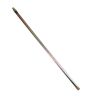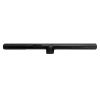AMS Signature Series Soil Augers
Features
- Signature Series is thicker and more durable than traditional threads
- Connection and disassembly with 2 1/2 turns
- Zinc-coated auger extensions improve rust resistance
- Expedited repair and warranty service
- Lifetime technical support
- More
Signature Series Connection
The AMS Signature Series connection is an enhanced version of the already trusted AMS threaded connection. The Signature Series features zinc coated extensions to improve rust resistance as well as a larger capacity auger with no weld or grind marks for easy decontamination. The Signature Series thread design is available on a variety of AMS regular, mud, dutch and sand augers, cross handles, extensions, core samplers, slide hammers and adapters.
Regular Soil Augers
AMS Regular Augers are designed for use in most soil types. The AMS regular soil auger is commonly used for obtaining disturbed soil samples at or near the surface and for boring to depths where soil samples may be obtained with a separate soil sampler or soil core sampler. The bits of the regular soil auger are open to allow entry of small soil clumps and relatively small rocks and particles.
Mud Augers
AMS Mud Augers utilize a laser-cut, open cylinder design for easy removal of heavy, wet, or clay soils. The AMS mud auger features two openings in the cylinder wall to facilitate emptying as well as wider spaced bits than the AMS regular soil auger to ease entry of sticky soils.
Sand Augers
AMS Sand Augers are designed for use in sands and dry soils. The AMS sand auger uses a closed bit design with a restricted opening to prevent the loss of sampled material during retrieval. The sand auger has a cylinder similar to the regular soil auger, but the inner edges of the sand auger bits touch at their mid point to make the sand auger a much more reliable auger in loose, unconsolidated soil conditions.
Dutch Augers
The AMS Dutch Auger allows you to easily collect disturbed soil samples in heavily rooted areas. Hand forged from high-carbon steel and honed to a fine cutting edge, this auger will cut through highly fibrous and heavily rooted soils. It is excellent for use in, forests, vineyards and orchards. The unique open design of the dutch auger also allows for easier removal of hard or wet soils.
In The News
From Paddles to Phytoplankton: Studying Vermont’s Wildest Lakes
For six months of the year, Rachel Cray, a third-year PhD student at the Vermont Limnology Laboratory at the University of Vermont, lives between a microscope and her laptop, running data. For the other six months, she is hiking and canoeing four of Vermont’s lakes, collecting bi-weekly water samples. Cray studies algal phenology across four lakes in Vermont, US, that have low anthropogenic stress—or in other words, are very remote. Funded by the National Science Foundation Career Award to Dr. Mindy Morales, the lakes Cray researches part of the Vermont Sentinel Lakes Program, which studies 13 lakes in the area and, in turn, feeds into the Regional Monitoring Network, which operates in the Northeast and Midwest US.
Read MoreReimagining Water Filtration: How Monitoring and Science Enhance FloWater Filtration Systems
Over 50% of Americans think their tap water is unsafe , according to the Environmental Working Group (EWG). Other recent surveys have found that number to be as high as 70% of persons surveyed. Whether due to increased public awareness of water quality issues or confusion about how municipal water sources are regulated, there is a clear distrust of tap water in the United States. According to industry expert Rich Razgaitis, CEO and co-founder of the water purification company FloWater, this issue creates a damaging cycle. Razgaitis explained that the health and environmental problems associated with contaminated water aren’t the only issues. As people become increasingly aware that some tap water is unsafe, they resort to bottled water.
Read MoreMonitoring New Hampshire’s Aquatic Ecosystems: Continuous Data Collection in the Lamprey River Watershed
New Hampshire’s aquatic ecosystems provide a range of ecosystem services to the state and region. Resources and services like clean water, carbon storage, climate regulation, nutrient regulation, and opportunities for recreation all depend on New Hampshire’s aquatic ecosystems remaining healthy. Jody Potter, an analytical instrumentation scientist at the University of New Hampshire (UNH), is studying these aquatic ecosystems in hopes of developing an improved understanding of ecosystem services and their interactions with climate change, climate variability, and land use changes. [caption id="attachment_39799" align="alignnone" width="940"] Aquatic sensors in the Merrimack River in Bedford, NH, with I-293 in the background.
Read More








































